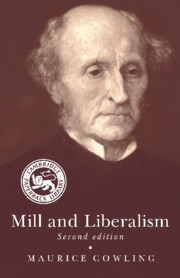4 - Liberalism and the Religion of Humanity
Published online by Cambridge University Press: 05 November 2009
Summary
The position we are maintaining is that Mill's fundamental principles have neither proof nor philosophical authority, but are commitments to action, the outcome of assertions to claim knowledge of the nature of the world and the direction men's duty ought to take within it: and that they cannot sustain claims to be something other, or something more, than this. Mill seems sometimes to suggest that they perform one function—a philosophical, or even a positive, scientific one—but at times that they perform the other, practical one. He does not always think that they have scientific authority: at moments when he is most explicit, he does not say so at all. Nevertheless, where assumptions are made without scrutiny, he seems to think it; and it is difficult to avoid feeling that much of what we will characterize as his arrogance is connected with want of clarity at this point.
The statements we have been discussing are religious: Mill himself says so. The principle of utility enjoins maximization of the finest things of which men are capable: and this is what Mill means by the Religion of Humanity.
Not only does all strengthening of social ties, and all healthy growth of society, give to each individual a stronger personal interest in practically consulting the welfare of others: it also leads him to identify his feelings more and more with their good.… He comes, as though instinctively, to be conscious of himself as a being who of course pays regard to others. […]
- Type
- Chapter
- Information
- Mill and Liberalism , pp. 77 - 94Publisher: Cambridge University PressPrint publication year: 1990

